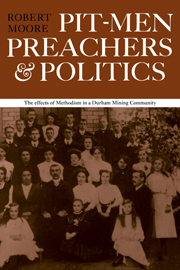Book contents
- Frontmatter
- Contents
- Dedication
- Acknowledgements
- List of abbreviations
- Introduction
- 1 Historical background
- 2 The Deerness Valley
- 3 The social and economic basis of paternalism: the colliery-owners in the Deerness Valley
- 4 Village Methodism – I
- 5 Village Methodism – II: the structure of the Methodist societies in the Deerness Valley
- 6 The respectable Methodists and the old Liberalism
- 7 The radicals and the Labour Movement, 1900–1926
- 8 Methodists in action: three political case studies
- 9 1970 – a postscript
- Conclusions
- Appendix I research strategy and techniques
- Appendix II the Methodist community and objections to Anglican union
- Appendix III the religious statistics
- Appendix IV occupational status, social mobility and the structure of Methodist leadership
- Notes
- Bibliography
- Glossary
- Index
3 - The social and economic basis of paternalism: the colliery-owners in the Deerness Valley
Published online by Cambridge University Press: 24 November 2009
- Frontmatter
- Contents
- Dedication
- Acknowledgements
- List of abbreviations
- Introduction
- 1 Historical background
- 2 The Deerness Valley
- 3 The social and economic basis of paternalism: the colliery-owners in the Deerness Valley
- 4 Village Methodism – I
- 5 Village Methodism – II: the structure of the Methodist societies in the Deerness Valley
- 6 The respectable Methodists and the old Liberalism
- 7 The radicals and the Labour Movement, 1900–1926
- 8 Methodists in action: three political case studies
- 9 1970 – a postscript
- Conclusions
- Appendix I research strategy and techniques
- Appendix II the Methodist community and objections to Anglican union
- Appendix III the religious statistics
- Appendix IV occupational status, social mobility and the structure of Methodist leadership
- Notes
- Bibliography
- Glossary
- Index
Summary
The collieries of Waterhouses, Esh Winning and Ushaw Moor were part of the industrial empire of the Pease family. The Peases' interests were mainly centred in Tees-side in iron-stone mining, iron and steel, and the North Eastern Railway. The village of Peases West at Crook was a local centre for coal and coke, most of which was supplied to the Peases' own ironworks. Thus the Deerness Valley collieries were part of a closely integrated and economically interdependent set of industries.
The Cornsay Colliery was owned by Ferens and Love. Love had started his working-life as a pit-boy at eight years old; he became a colliery manager, started a grocery and drapery business, and then became a mill-owner, a ship-builder and a ship-owner and finally the part or whole owner of six collieries. He was probably the last coal entrepreneur to rise from the ranks of hewers.
Hamsteels Colliery originally belonged to Johnson and Reay, then to J. B. Johnson, a local Durham City man. Johnson was a small businessman compared with Pease, his enterprises being Hamsteels Colliery and the City Brewery. Johnson died in 1919 and the colliery was purchased by the Saddler brothers in 1921.
Pease and Partners was a family company until 1898 when it became a limited liability company. It thus underwent some reorganisation in the period of the international development of combines and cartels. During the early period, especially under Joseph Whitwell Pease, a tradition of paternalism had developed.
- Type
- Chapter
- Information
- Pitmen Preachers and Politics , pp. 78 - 92Publisher: Cambridge University PressPrint publication year: 1974



